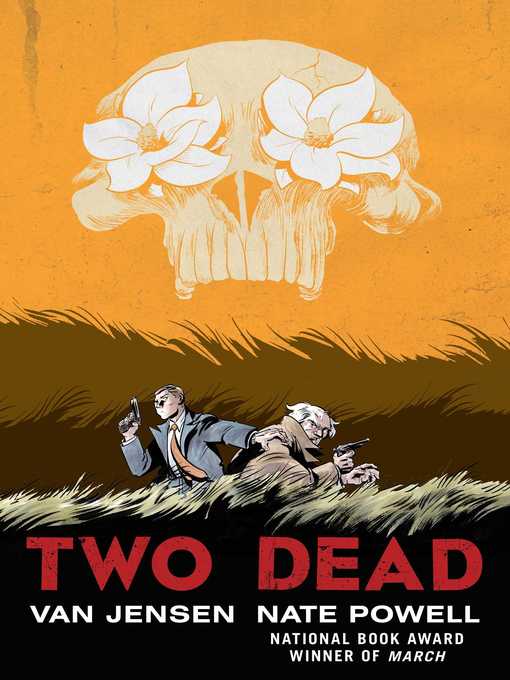
Two Dead
کتاب های مرتبط
- اطلاعات
- نقد و بررسی
- دیدگاه کاربران
نقد و بررسی

September 15, 2019
Writer Jensen (James Bond: Live and Let Die, 2019, etc.) and illustrator Powell (Come Again, 2018, etc.) deliver a kinetic noir graphic novel about the cost of war and guilt as a straight-arrow soldier with blood on his hands returns from World War II to restore order in his hometown, plunging into a volatile mix of police corruption, racism, and the mob. Gideon Kemp was a good soldier with plans to be a lawyer, but after a friendly-fire incident in the war he becomes a cop in Little Rock, Arkansas, secretly building a case against Abraham Bailey, the loose-cannon chief of detectives who shoots first in his personal war on crime--and with the mob setting up shop in town, that's a lot of shooting. The unhinged Bailey shares a macabre compulsion with his foe, mob boss Big Mike, though the sadistic Big Mike comes across as the more reasonable of the two, offering a promotion to Esau, the numbers runner in the mobster's illegal poker room, after Esau doesn't give up his boss when assaulted by Bailey during the detective's extrajudicial search for evidence. Noting the absence of opportunities for African Americans like them in Little Rock, Esau encourages his brother, Jacob, to quit the ad hoc police force of war veterans who patrol the underserved black side of town (only by the grace of the all-white Little Rock Police Department) and instead embrace the money and respect offered by the mob. The knotty story shows the traumas of the past shaping the present, some panels literally haunted by specters. Fresh from his work on John Lewis' acclaimed March trilogy, Powell applies a pleasingly realistic look while cartoonish flourishes electrify the page. Jensen weaves a propulsive narrative of intersecting stories and festering wounds that doesn't quite deliver a knockout punch but is highly engaging. Good pulp.
COPYRIGHT(2019) Kirkus Reviews, ALL RIGHTS RESERVED.

November 4, 2019
The plot rocketing this dramatic, socially conscious crime story is fictional, but its fuel is the true tales that Jensen (Cryptocracy) dug up as a crime reporter. The graphic novel starts in 1946 with clean-cut but haunted war hero Gideon joining the Little Rock, Ark., police force. He’s tossed into a car with his opposite: Chief Bailey, a cigar-puffing volcano of an officer, whose mind is unraveling. Together, the men knock the legs out from under the sadistic Mafia psychopath running Little Rock’s seamy criminal underbelly. The standard buddy cop narrative is given fresh weight by Bailey’s delusional mania (“I am the cleansing flame”). Told in parallel is the tortured family history of African-American brothers Jacob and Esau, who are operating on either side of the law, and yet must both face the biblical fury and collateral damage of Bailey’s vendetta. Jensen further tangles the narrative with vividly depicted historical detailing, such as the militia-like black police force that operated in tandem with the white police. The noirish, harshly shadowed art from Powell recalls his work on March, with a brutal dusting of Frank Miller. The Southern gothic atmosphere and sedimentary layers of guilty consciences read like one of the (better) seasons of True Detective. This lurid, violence-spattered crime graphic novel might be made up, but the questions it raises are a real gut punch. Final color pages not seen by PW. Agent: Charlie Olsen, Inkwell

Starred review from November 15, 2019
Gideon Kemp is haunted by a terrible mistake made as a soldier in Germany in 1944. Now a detective, he is charged by the mayor of his southern city with helping take down Chief of Detectives Abe Bailey, who doesn't see any problem that can't be solved with a bullet. Bailey is haunted more urgently and more literally by his own terrible mistake more than two decades ago. Kemp and Bailey's paths intertwine and eventually collide in Little Rock, Arkansas, a town not so much haunted by its racial violence as actively throttled by it. Police never go to the Black neighborhood, which has its own unofficial Black police force, whose chief, Jacob Davis, has a brother working his way up the ladder of organized crime. Betrayal and violence sizzle and broil in this graphic novel, right down to its extraordinary lettering, its size fluctuating, its style shifting, and the words sitting rough and uneasy in their confining balloons. . Award-winning cartoonist Powell (the March trilogy) imbues his characters with distinctive visual personalities and humanizes them with a subtle softening and rounding of lines even as he evokes the moral dread with shadows that push into figures and landscapes and bleed blackly across the page. An intense, gritty, thrilling crime story and a painful rumination on race, rage and, inescapable ghosts, this could be an early contender for the next awards season.(Reprinted with permission of Booklist, copyright 2019, American Library Association.)

























دیدگاه کاربران